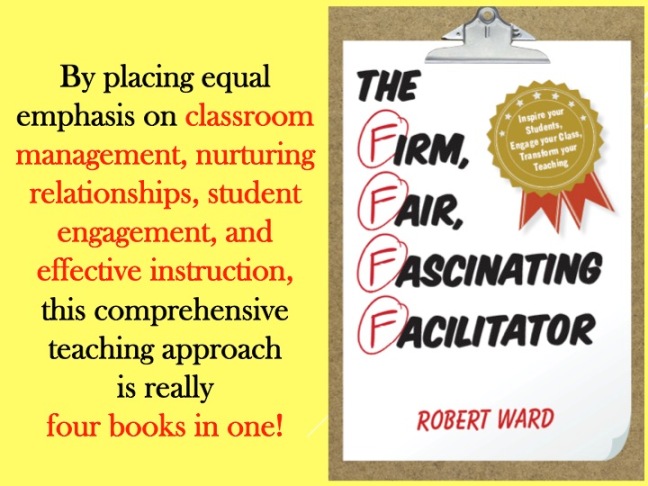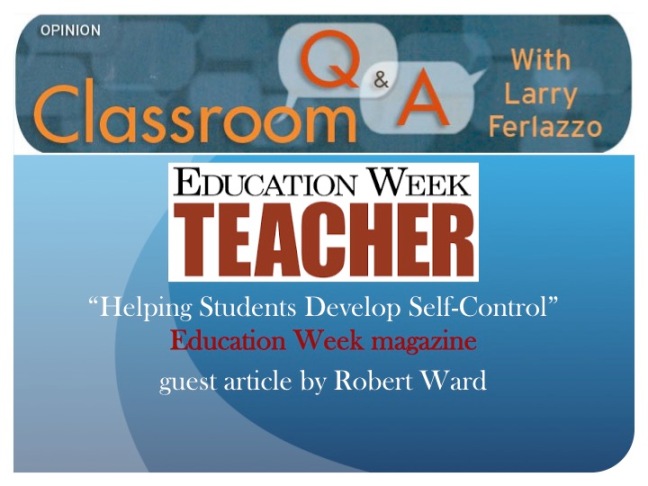Educators are waking up to the fact that academic learning is intertwined with social, emotional, and soulful learning. Although balance is imperative in helping all students become successful and satisfied, both in the present and future, we still too often approach problems in a one-sided way, neglecting the big picture of the four fundamental needs of children.
Therefore, a child’s self-control is no more or less important than their self-confidence, self-expression, or self-efficacy, and each crucial component must be addressed holistically and equally, right from the beginning. Teachers must all at once capture their students’ hearts, hopes, minds, and manners.

Through this comprehensive approach, every student quickly learns that their dutiful cooperation and courtesy only enhance a classroom environment that also supplies them with community and celebration, curiosity and creativity, and comprehension and capability. Students fortunate to be in this teacher’s class are now thoroughly motivated, not just by the old-school doctrine of “I must” (because my teacher firmly enforces their class procedures) but by three additional enticements:
- “I should” (because my fair teacher encourages, listens to, and praises me for my efforts and accomplishments)
- “I want to” (because my fascinating teacher allows me meaningful, engaging opportunities for choice, challenge, collaboration, critical thinking, and personal connections)
- “I can” (because my teacher as facilitator assists me in independently accessing and interacting with the complex and unfamiliar)
Thus a child who is completely motivated by thoughts of “I must, I should, I want to, and I can” quickly decides, “I will!”
When teachers transform their students’ thoughts into actions, they move them from being passive consumers of knowledge into active producers of insight and intellect. There simply is no room or rationale to be distant, disconnected, or defiant when students have been given the support, stimulation, skills, and structure to excel.
It no longer becomes an isolated issue of student self-control but of willpower for what purpose? A firm, fair, fascinating facilitator provides students four persuasive reasons to risk, relate, respond, and respect.

If we want children to be reliable and resilient, perseverant and prepared, as well as focused and fearless, teachers must assist them in becoming so—not only by supervising and regulating them but also by increasingly giving kids responsibility, by allowing them to earn trust, and by holding them accountable for their decisions.
Children develop self-control only when they have been granted appropriate opportunities and experiences of actual control from which they can learn and grow.
Even in the best of circumstances, all the love, laughter, and learning that teachers lavish upon students do not amount to much without also providing the essential leadership kids need to make their way in a world filled with an onslaught of changes, choices, and charms.
Therefore, every child requires guidelines and guidance, as well as order and authority, in order to navigate the inevitable complexities and crises of life. Teaching self-control is not just about school; it is about preparing kids for life.

When adults chronically shield children from every danger, dilemma, disappointment, and disgrace, they only deprive kids of the crucial life lessons that teach them how to cope with harsh realities and how to adjust their choices to better manage their emotions and outcomes.
Children must know in no uncertain terms that actions have consequences and that personal effort, attention, and integrity directly affect results, reactions, and rewards. With some support and lots of modeling, kids gradually learn to constructively handle struggles, stumbles, and setbacks—even successes—on their own.
This is the true sense of control we want for kids and what they really want for themselves. Kids are looking to their teachers for strong leadership, which means both setting limits and setting the conditions for unlimited potential. Both aspects of leadership are indispensable in shepherding children toward the independence and greatness that come in large part through self-control.
***
How do you attend to the needs of the whole child and equally develop your students’ social, emotional, soulful, and academic needs? Please share your insights, opinions, and experiences in the Comments section below.

Read the original article in Education Week magazine: Classroom Q & A with Larry Ferlazzo (November 26, 2016).

For more on this whole-child approach to teaching, check out Robert Ward’s The Firm, Fair, Fascinating Facilitator: Inspire your Students, Engage your Class, Transform your Teaching published by Rowman & Littlefield.
Read more about Robert’s books for educators here.




Another great post, thank you for emphasizing the critical, central position that a child’s emotional condition takes with regard to their ability to learn, and for exhorting teachers (and parents) to take ownership of their responsibility to nurture children’s emotional wellbeing.
LikeLiked by 1 person
Thank you for your comments, Sonja. I always appreciate how you move the conversation forward in an insightful, positive way!
LikeLike
LikeLike
LikeLike
LikeLike
LikeLike
LikeLike
https://twitter.com/jesi_mcghee/status/803419792938037249
LikeLike
LikeLike
LikeLike
https://twitter.com/LeahDumont2/status/803039250111483904
LikeLike
https://twitter.com/keep43ca/status/803029673588334592
LikeLike
https://twitter.com/LeahDumont2/status/803000513864355840
LikeLike
https://twitter.com/Meli_Smith4/status/802854835901100036
LikeLike
LikeLike
LikeLike
LikeLike
LikeLike
LikeLike
https://twitter.com/thebretthill/status/802589366241652736
LikeLike
LikeLike
LikeLike
LikeLike
LikeLike
LikeLike
LikeLike
LikeLike